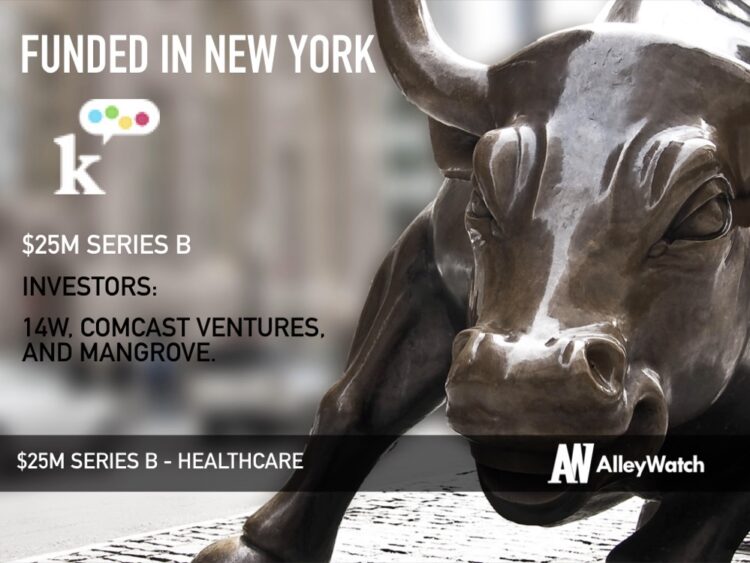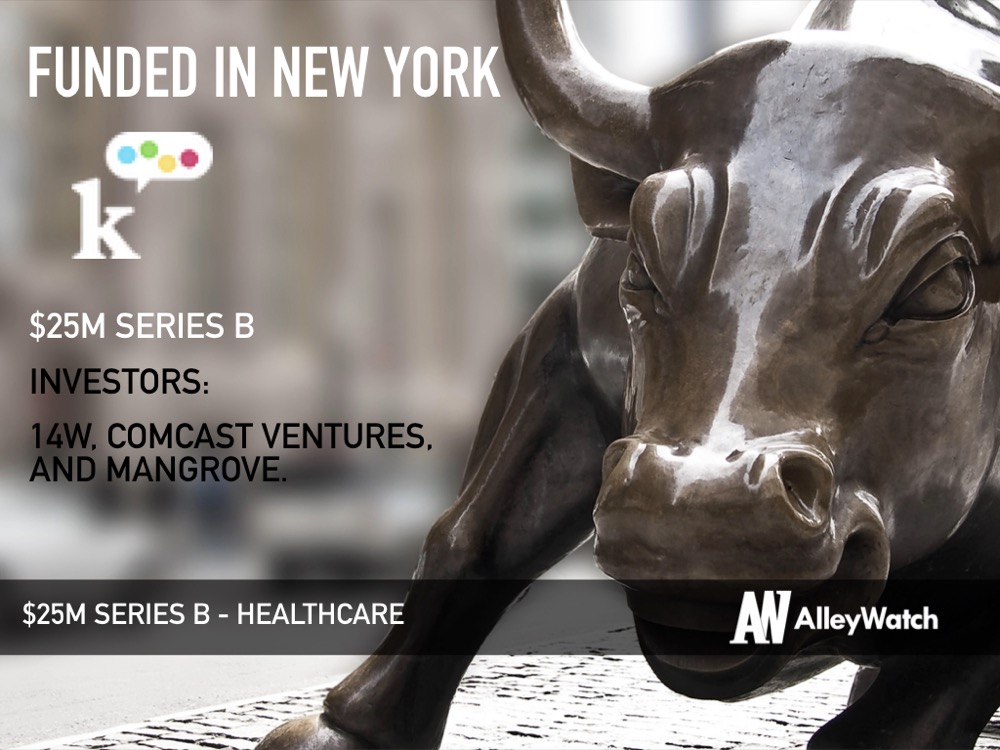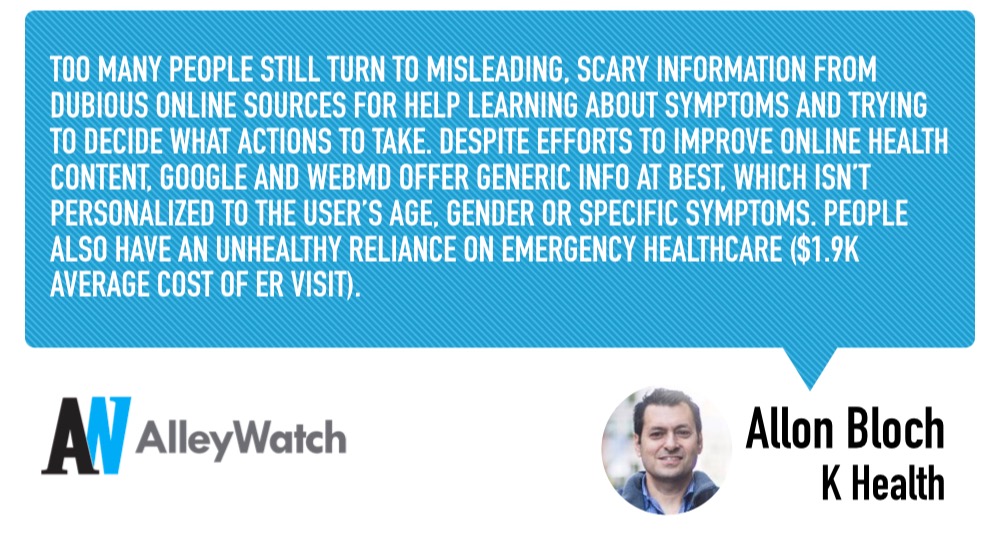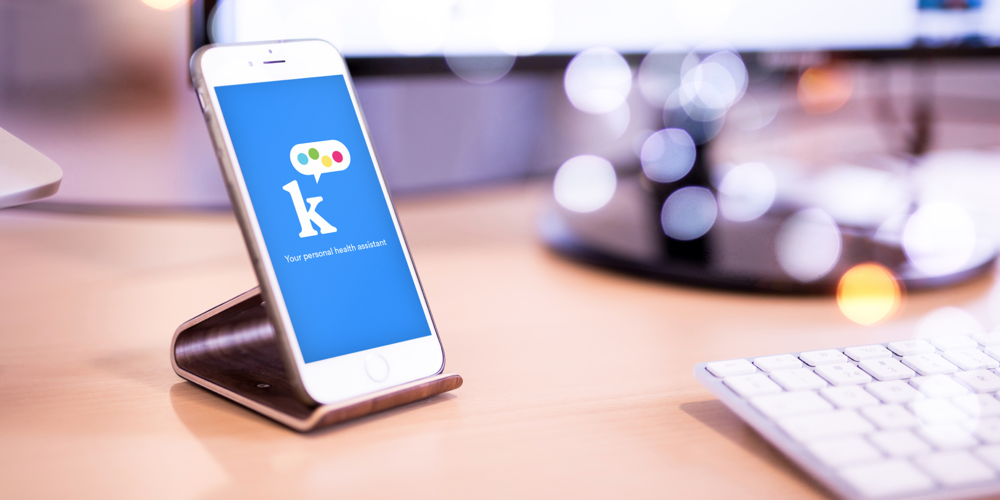Self-diagnosing yourself with an obscure, terminal illness is a modern-day phenomenon perpetuated by frantic Google searches and “expert” forums, but K Health puts an end to this through its AI-driven primary care app. This app provides users with direct access to trustworthy health information that has been accumulated from a vast dataset of 2B anonymized health events over the past 20 years. AI is used to synthesize this data from hospitalizations, labs, doctor’s notes, drugs, and outcome data, to provide a predictive model that exponentially increases accuracy of diagnosis by enabling people to compare themselves to similar people based on characteristics like gender, age, and very specific symptoms and medical history. Rather than rely on information available that isn’t tailored, K Health uses a personalized approach that is tailored with real life data.
AlleyWatch had the pleasure of speaking to founder Allon Bloch about the exciting trajectory of K Health and its recent funding round, which brings the total funding amount to $37.5M across four rounds.
Who were your investors and how much did you raise?
K Health raised $25M in Series B funding. The round was led by 14W, Comcast Ventures, and Mangrove, bringing the company’s total funding to $37.5M.
In addition to this news, Alex Zubillaga, an early investor in Spotify and the Managing Partner of 14W, has joined the company’s board, along with Shawn Leavitt of Comcast who is also joining as an observer. Leavitt, who serves as SVP of Total Awards, is driving the charge at Comcast to create significantly better healthcare within the corporation’s employee base.
Tell us about the product or service that K Health offers.
K is AI-driven primary care app that offers users direct access to reliable health information to understand their potential health conditions and assess treatment options. K has essentially created a way for people to learn about their health by leveraging AI to compare your case to millions of ‘People Like Me’.
By using a vast dataset of 2B anonymized health events over 20 years (doctor’s notes, hospitalizations, labs, drugs and outcome data) K was able to create an accurate predictive model that enables people to learn about their health by comparing themselves to similar people (based on gender, age and very specific symptoms and medical history).
What inspired you to start K Health?
Too many people still turn to misleading, scary information from dubious online sources for help learning about symptoms and trying to decide what actions to take. Despite efforts to improve online health content, Google and WebMD offer generic info at best, which isn’t personalized to the user’s age, gender or specific symptoms. People also have an unhealthy reliance on emergency healthcare ($1.9K average cost of ER visit).
We asked ourselves, what if you could compare your situation to millions of other people like you who’ve been through the same thing before? That was the question that sparked the creation of K Health.
How is K Health different?
K is much more than just a symptom checker or chatbot, which are typically powered by a system of rules. K Health is the only system to run on true AI, so the information we present is based on the experience of 10K doctors over 20 years. We use proprietary AI technology we developed for turning massive amounts of health data into knowledge that’s useful for consumers.
What market does K Health target and how big is it?
Anyone interested or concerned about their health can use K! It works for adults ages 18-85 for most primary care and ER conditions. It’s not for kids, pregnancy, orthopedics, or dermatology.
What’s your business model?
The information and the app will always be free. We are fortunate to have investors who have allowed us to build a strong product, with many potential applications for monetization down the road.
What was the funding process like?
We had a lot of healthy interest because of the power of the product. It was fun to bring together investors who have a lot of enthusiasm for what we’re building.
We chatted in July after your last raise. How has the business changed since then? Is the decision to raise so soon thereafter a reflection on some expectations in the venture market?
We’re gaining incredible traction and our user base has grown tremendously. We now have 500K users, and we’re adding 10-15K users every day. We were briefly the #1 app in the Health & Fitness category in the App Store and Google Play.
We’re launching a virtual care offering in 2019, which will allow users to chat with an MD in the app for a small fee. Not only will it be a fast and affordable option for consumers, but our doctors will also validate the AI and accelerate the intelligence of our self-learning system.
We’re launching a virtual care offering in 2019, which will allow users to chat with an MD in the app for a small fee. Not only will it be a fast and affordable option for consumers, but our doctors will also validate the AI and accelerate the intelligence of our self-learning system.
What are the biggest challenges that you faced while raising capital?
Thankfully we haven’t had many challenges raising the capital we need. We’re focused on executing against our ambitious vision to make AI-driven healthcare a reality.
What factors about your business led your investors to write the check?
We can’t speak for all of them, but in general, K’s unique approach, proprietary technology, and potential for market impact were major factors that drew investor interest. K has already begun to change people’s lives. We hear powerful stories all the time from people who decided to see a doctor because of the insights they received from K, or felt comfortable staying home because they didn’t need to seek professional care. And this is just the beginning
What are the milestones you plan to achieve in the next six months?
K Health will launch in-app virtual visits in early 2019 to increase access to doctors and accelerate the intelligence of K’s self-learning system. Users who would like to consult a doctor will be instantly connected to a board-certified primary care or ER doctor for a small fee. A doctor will join the conversation, having reviewed K’s AI-driven triage of the patient’s symptoms. This will make for faster, more convenient care backed by real data and an experienced physician. The service will be available to adults 18+ regardless of insurance status, and doctors will diagnose, prescribe, or refer patients to in-person care as appropriate.
What advice can you offer companies in New York that do not have a fresh injection of capital in the bank?
To focus on building a great product that adds a lot of value to society. Once you do that, you will be recognized by investors and customers alike.
Where is your favorite bar in the city for an after work drink?
A consistent great one is Hillstone Park Avenue. Great place for small team dinners and long nights of product debates!






